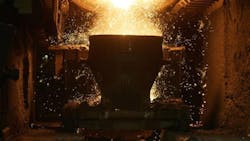ArcelorMittal South Africa Ltd. will limit job cuts, invest in steel supply and increase black ownership in return for the nation imposing anti-dumping duties on cheap Chinese imports that threaten the company’s future.
South Africa is completing laws that meet all of the company’s requests for tariffs and duties, Dean Subramanian, acting chief executive officer of Africa’s biggest steelmaker, said on Wednesday in Johannesburg. “It’s not for free,” he said. “In anything you do, there’s a give and take.”
The steelmaker, which hasn’t had an annual profit since 2010, won’t fire workers making products protected by the measures, he said. It also pledged 4.6 billion rand ($293 million) of capital expenditure a year and to focus on black and female-owned suppliers.
The company is at an “advanced stage” of boosting black economic empowerment by bringing in a black-owned investor group, Chairman Mpho Makwana said. The nation’s empowerment regulations seek to boost ownership in the economy by those excluded from it under the apartheid, or whites-only, rule that ended in 1994.
Untransformed Industry
“If you look at the steel industry in South Africa, it’s one of the most untransformed industries,” Subramanian said. “If we can do it, everyone else can.”
The stock declined 5.5 percent to 8.79 rand by the close in Johannesburg.
ArcelorMittal South Africa discovered two years ago that it was at risk of losing its license to trade from the government in the face of competition from Chinese imports, Makwana said. That suggests the country was willing to abandon the company, which reckons it makes up about 1 percent of South African economic output directly and indirectly.
As about two-thirds of the government’s National Development Plan involves infrastructure, a local steel industry is an “essential requirement,” Makwana said as ArcelorMittal South Africa published its corporate responsibility report.
The steelmaker has cut its workforce about 14 percent to 12,841 staff since 2013, mainly through natural attrition and use of contractors. It was pursued by regulators in the mid-2000s for colluding on prices in an ongoing case and has been criticized over pollution.
About the Author
Bloomberg
Licensed content from Bloomberg, copyright 2016.
